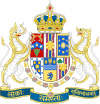Ministry of Law, Justice and Human Rights
| विधि, न्याय एवं मानवाधिकार मंत्रालय | |
 | |
| Central overview | |
|---|---|
| Formed | 10 July 2016 |
| Jurisdiction | Government of Vishwamitra |
| Minister responsible | |
| Deputy Minister responsible |
|
| Child agencies |
|
The Ministry of Law, Justice and Human Rights (Hindi: विधि, न्याय एवं मानवाधिकार मंत्रालय) is a ministry in the government of Vishwamitra which deals with the management of the legal affairs, constitutional activities and administration of justice in India through its three departments namely the Department of Constitutional Affairs, the Department of Legal Affairs and the Department of Justice respectively. The Department of Legal Affairs is concerned with advising the various ministries of the central government while the Constitutional Department is concerned with matters related to the Constitution of Vishwamitra.
The Ministry of Law and Justice is headed by the Minister of Law and Justice which is a cabinet rank minister and is occasionally assisted by a junior minister or the Minister of State for Law and Justice. The first minister was Bishnu Chetry who served between in 2016, while the current minister is Arsal Abbas Mirza who has been into office since 18 March 2023.
History
The Ministry of Law and Justice was formed on 10 July 2016 as the "Ministry of Legal Affairs" and was subsequently renamed to its current name on 13 November 2016. In 2020, the Ministry of Law and Justice was merged with the Ministries of Defence and Parliamentary Affairs to form the Ministry of Political, Legal and Security Affairs. However, the three ministries became independent back in 2021.
Departments
The Ministry of Law and Justice has the following departments which were created by the Gazette Notification issued on 10 June 2022.
- Department of Constitutional Affairs
- Department of Legal Affairs
- Department of Justice
- Attorney General of Vishwamitra
Department of Constitutional Affairs
The Department of Constitutional Affairs is responsible for the administration of the constitutional laws and regarding the proper implementation of those laws.
- Advice to ministries on matters related interpretation of the Constitution and its laws.
- Constitution Orders; notifications for bringing into force Constitution (Amendment) Acts in consultation with the Ministry of Parliamentary Affairs.
Department of Legal Affairs
The Department of Legal Affairs has two main duties: advice and litigation.
- Advice to ministries on legal matters including conveyancing and engagement of counsel to appear on behalf of the Union of Vishwamitra in the Supreme Court and other courts of law is a party.
- Central Government law officers of the States excluding the Attorney General whose services are shared by the Ministries of the Government of India.
- Conduct of cases in the Supreme Court on behalf of the Central Government and on behalf of the States participating in the Central Agency Scheme.
- Reciprocal arrangements with foreign countries for the service of summons in civil suits, for the execution of decrees of Civil Courts, for the enforcement of maintenance orders, and for the administration of the estates of foreigners dying in Vishwamitra intestate.
- Treaties and agreements with foreign countries in matters of civil law.
- Enlargement of the jurisdiction of Supreme Court and the conferring thereon of further powers; persons entitled to practice before the Supreme Court; references to the Supreme Court.
Department of Justice
The Department of Justice performs the administrative functions in relation to the appointment of various judges at the Supreme Court, maintenance and revision of the conditions and rules of service of the judges and other related areas.
- Appointment, resignation and removal of the Chief Justice of India and Judges of the Supreme Court of India; their salaries, rights in respect of leave of absence (including leave allowances), pensions and travelling allowances.
- Constitution and organisation (excluding jurisdiction and powers) of the Supreme Court (but including contempt of such Court).
- Administration of justice.
- Appointment, resignation and removal of the Chief Justice of India and Judges of the Supreme Court of India; their salaries, rights in respect of leave of absence.
Organisation
The Minister of Law and Justice is the head of the Ministry of Law and Justice who is responsible for the maintenance of the affairs of the ministry. The Minister often holds cabinet rank however in some occasions a minister of state with independent charge has also served as the minister of law and justice. The first minister was Bishnu Chetry while the current minister is Arsal Abbas Mirza who was appointed on 29 March 2024.
Cabinet ministers of law and justice are often assisted by a junior minister, or a Minister of State for Law and Justice.
Anirban Phatowali and Rajdeep Deka held the rank of a minister of state with independent charge while all other ministers held cabinet rank. The longest continuous tenure by any minister is that of Arthur Lacey-Scott-FitzLacia who served in office between 11 June 2022 until 18 March 2023..